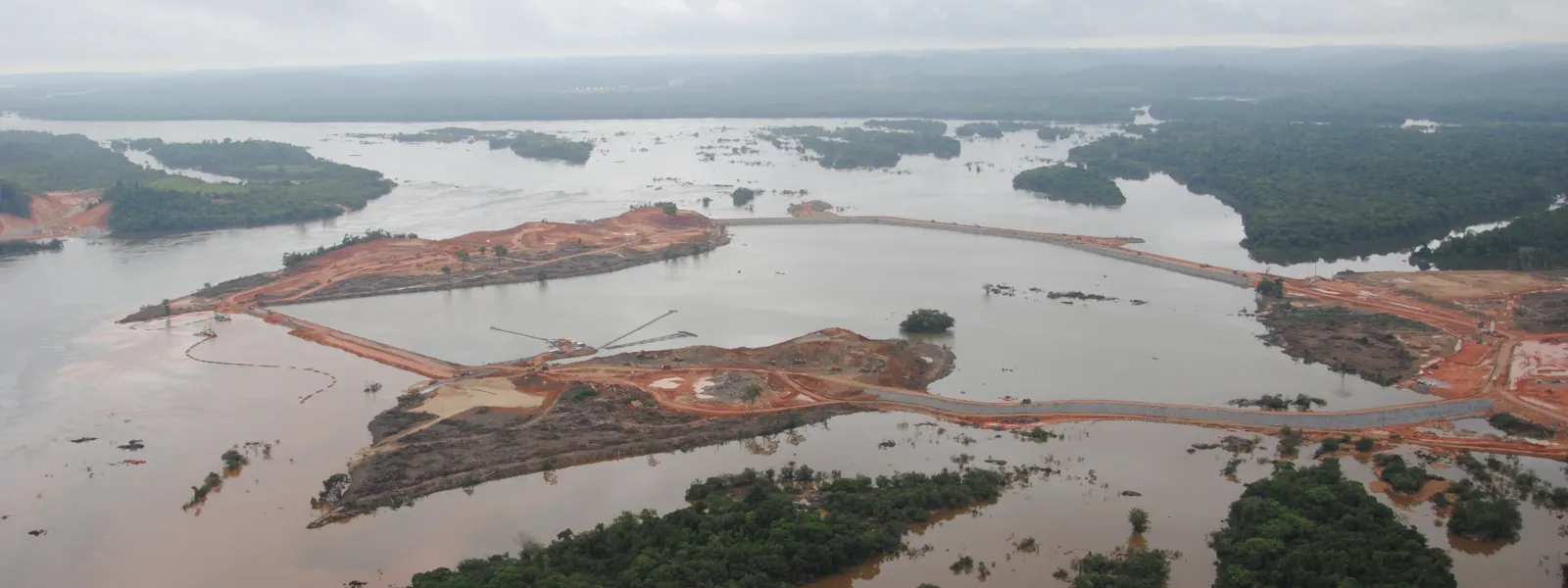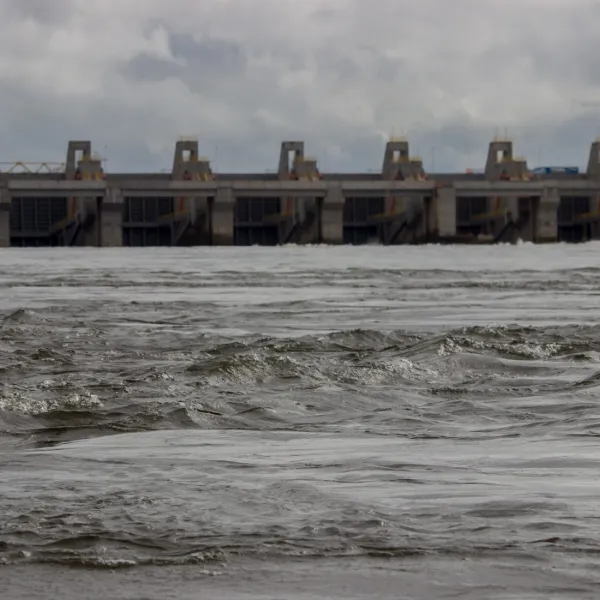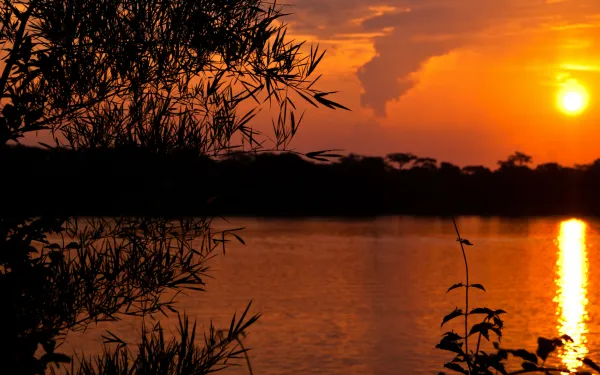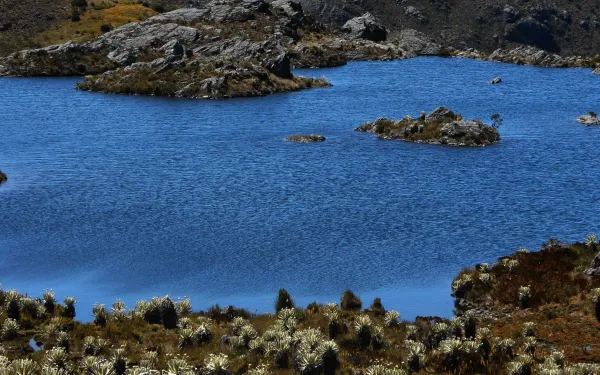
Project
Programa de Aceleração do CrescimentoHalting the implementation of large dams in the Americas
The more we learn, the clearer it becomes that large dams are unsustainable energy sources.
From the Mexican highlands to the Amazon River basin, hydroelectric mega-projects are aggravating climate change, destroying sensitive ecosystems, and threatening human rights and indigenous cultures.
In October 2016, a research study from Washington State University found that the world’s reservoirs generate 1.3 percent of all greenhouse gases (more than the total emissions of Canada!), confirming the damage dams do to our climate.
Large dams have no place on our rapidly changing planet. In a time of intensifying droughts, many vulnerable hydropower-dependent countries are facing energy shortages. And as extreme weather events increase around the world, the inherent danger of large dams becomes more evident.
Throughout the construction of Belo Monte, the world’s third largest dam, we’ve seen firsthand the grave impacts these projects have on the ecosystems in which they’re built. We’ve witnessed the violations they impose on the rights of indigenous and riverine communities, whose culture and livelihoods are tied so closely to the natural world.
Yet, across Latin America and the world, large dams are still being promoted as “clean and green” energy sources; and are even receiving support from national and international climate initiatives.
That support is part of the reason more than 3,700 large dams are currently being planned or constructed worldwide, more than 400 of which have been proposed for the vital Amazon River Basin.
At AIDA, we’re proud to be part of a team leading the fight against large dams across Latin America and beyond.
Partners:

Related projects

Statement on the Assassination of Dilma Ferreira Silva, leader of Brazil’s Movement of Dam-Affected Peoples
In the face of the brutal crime committed on March 22nd against a coordinator of the Movement of Dam-Affected Peoples in Brazil, the undersigned human rights and environmental organizations call on Brazilian authorities and multilateral organizations to ensure that the country’s obligations regarding the protection of human rights and environmental defenders are enforced. With deep sadness and indignation, we received the news that Dilma Ferreira Silva, a regional coordinator of Brazil’s Movement of Dam-Affected Peoples (MAB), together with her husband Claudionor Costa da Silva and Hilton Lopes, a friend of the family, were assassinated on Friday, March 22nd in the Amazonian state of Pará. The bodies of the three victims were found in her residence with signs of torture. Dilma Ferreira Silva was a prominent activist and recognized leader who, for more than three decades, fought for the rights of the people affected by the Tucuruí mega-hydroelectric dam project on the Tocantins River of the Brazilian Amazon, built during the country’s military dictatorship 1964-1985), provoking the displacement of an estimated 32,000 people, along with serious environmental damage. This is not the first case of a brutal murder perpetrated against a human rights defender in the region of the Tucurui dam. In April 2009, Raimundo Nonato do Carmo, a union leader who fought on behalf of those whose lives were ruined by the Tucuruí dam was shot seven times by two men on a motorcycle as he walked out of a supermarket on the street in which he lived in the town of Tucuruí. Dilma dedicated her life to promoting national policies that would effectively take into account the rights of dam-affected peoples, with due attention to gender issues that particularly affect the rights of women. Dilma Ferreira lived in the rural settlement of Salvador Allende, where land titles were issued for family farmers by the federal government in 2012, as a result of a popular mobilization of the Movement of the Landless Workers (MST), with support from MAB. However, the area continued to be coveted by land grabbers (grileiros) that invade and seize control of public and community lands. One such example is Fernando Ferreira Rosa Filho (aka ‘Fernandinho’) arrested by the civil police force of the state of Pará as the principal suspect in the triple homicide of Dilma Ferreira, Claudionor Costa da Silva and Hilton Lopes. The assassination of Dilma Ferreira Silva is evidence of the grave situation faced by human rights and environmental defenders in Brazil, a country that tops the global ranking in violence practiced against defenders, with one person murdered every six days in 2017. The incoming administration of President Jair Bolsonaro has intensified recent attempts to undermine Brazil’s progressive legislation on environmental protection and human rights - especially those of indigenous peoples, quilombolas (descendants of African slaves), family farmers and other traditional populations. Such attempts have often clashed with Brazil’s progressive Federal Constitution, approved in 1988 during a period of redemocratization that followed military rule. Backsliding on public policies, together with public statements that incite violence in conflictive areas, are seriously increasing the risks faced by human rights and environmental defenders such as Dilma Ferreira Silva. The undersigned human rights and environmental organizations express our solidarity with the family of Dilma and the Movement of Dam-Affected Peoples (MAB). Without a doubt, her assassination is a huge loss for the defense of the environment and human rights in the Amazon. We stand with the UN High Commissioner on Human Rights in demanding a complete, independent and imparcial investigation of the assassination of Dilma Ferreira Silva, as well as the exemplary punishment of those that carried out and ordered this horrendous crime. Moreover, we call on Brazilian authorities to ensure that the country’s domestic legislation and international obligations regarding the protection of human rights and environmental defenders are fully implemented, including preventative action to avoid further acts of violence. Signed, 1. 350.org 2. Aborigen-Forum 3. AMAR - Associação de Defesa do Meio Ambiente de Araucária 4. Amazon Watch 5. APREC Ecossistemas Costeiros 6. Arctic Consult 7. Articulação Antinuclear Brasileira 8. Asociación Interamericana para la Defensa del Ambiente - AIDA 9. Associação Mineira de Defesa do Ambiente – Amda 10. Association green alternative Georgia 11. Association of Journalists-Environmentalists of the Russian Union of Journalists 12. BAI Indigenous Women's Network in the Philippines 13. Bank Information Center (BIC) USA 14. Biodiversity Conservation Center 15. Both ENDS 16. Bretton Woods Project 17. Buryat Regional Association for Baikal 18. Business & Human Rights Center 19. Center for International Environmental Law - CIEL 20. CIDSE - International family of Catholic social justice organizations 21. Coalition for Human Rights in Development 22. Colegiado Mar RBMA/Reserva da Biosfera da Mata Atlântica - Grupo Conexão Abrolhos -Trindade 23. Coletivo de Mulheres do Xingu 24. Coletivo de Mulheres Negras de Altamira 25. Comisión Ecumenica de Derechos Humanos 26. Comité Ambiental en Defensa de la Vida 27. Conectas Direitos Humanos 28. Conseil Régional des Organisations Non Gouvernementales de Développement en RDC 29. Conselho Indigenista Missionário - CIMI 30. Corporación SOS Ambiental 31. Crescente Fértil 32. Derecho Ambiente y Recursos Naturales - DAR 33. Derechos Humanos y Medio Ambiente - DHUMA 34. Derechos Humanos y Medio Ambiente de Puno - Perú 35. DKA Austria 36. ECOA - Ecologia e Ação 37. Ecological Center DRONT 38. Ecolur Information NGO 39. Environmental Investigation Agency 40. Fastenopfer Switzerland 41. Focsiv - Federation of Italian Christian NGOs 42. Fórum em Defesa de Altamira 43. Foundation Sami Heritage and Development 44. Frente por uma Nova Política Energética para o Brasil 45. Front Line Defenders 46. Fundação Avina 47. Fundação Grupo ESQUEL 48. Future for Everyone 49. Global Witness 50. Green Dubna 51. Green Peace Brasil 52. ONG Guajiru 53. In Difesa Di - per i Diritti Umani e chi li difende 54. Indigenous Peoples Movement for Self-determination and Liberation (IPMSDL) 55. Instituto Igarapé 56. Instituto Terramar 57. Institutos Ethos 58. International Indigenous Fund for Development and Solidarity "Batani" dos EUA 59. International Land Coalition Secretariat 60. International Rivers 61. Katribu Kalipunan ng Katutubong Mamamayan ng Pilipinas (Katribu national alliance of indigenous peoples in the Philippines) 62. Kazan Federal University 63. Latin America Working Group 64. London Mining Network 65. Lumiere Synergie pour le Developpement 66. MAB - Movimento dos Atingidos por Barragens 67. Maryknoll Office for Global Concerns 68. MISEREOR 69. Movimento Nacional de Luta pela Moradia (MNLM) 70. Movimento Negro 71. Movimento Paulo Jackson - Ética, Justiça, Cidadania 72. Movimento Tapajós Vivo 73. Movimento Xingu Vivo para Sempre 74. Movimiento de Afectados por Represas de America Latina - MAR 75. O Movimento Nacional das Cidadãs Posithivas (MNCP) 76. Oyu Tolgoi Watch 77. Pax Christi - Comisión Solidaridad Un Mundo Alemania 78. Pax Christi Internacional 79. Pax Christi Toronto 80. Projeto Saúde e Alegria 81. Protection International 82. Public Interest law Center (PILC/CHAD) 83. Red de Comités Ambientales del Tolima 84. Red de Género y Medio Ambiente de México 85. REDE GTA 86. Resource Rights Africa da Uganda 87. Rivers without Boundaries International Coalition 88. Rivers without Boundaries - Mongolia 89. SAPÊ - Sociedade Agrense de Proteção Ecológica 90. SCIAF - Scottish Catholic International Aid Fund 91. Serpaj Chile 92. Siberian Environmental Organization 93. Socio-ecological Union International 94. Tatarstan Organization of the All-Russian Society for the Conservation of Nature 95. Terra 1530 96. The Canadian Catholic Organization for Development and Peace/Caritas 97. The Society for Threatened Peoples International STPI - Gesellschaft für bedrohte Völker-International, GfbV-International 98. The Volunteer Movement Save Utrish 99. Toxisphera - Associação de Saúde Ambiental 100. Tutela Legal Maria Julia Hernández 101. Uma Gota no Oceano 102. Uniafro Brasil 103. Washington Office on Latin America - Wola 104. WoMin African Alliance 105. World Wide Fund for Nature – WWF/Brasil
Read more
Conserving our water, drop by drop
Water is powerful. Even the idea of not having it in our daily life disturbs us. Yet we so often take it for granted. Many of us believe it will flow indefinitely, without having to do anything to guarantee its presence. As if to prove how wrong we are, reality has been hitting us harder and more frequently. In 2016, Bolivia suffered its worst drought in 25 years. Water scarcity affected five of the country’s nine departments, and a national emergency was declared. In the city of La Paz, seat of the federal government, the water cut-offs employed to confront the crisis led to some people having to subsist up to two days on only 50 liters of water. Bolivia isn’t an isolated case. Since 2010, central Chile has been experienced a mega-drought that is far from ending. And in 2018, the drought in Central America caused severe crop losses, putting the food of millions of people at risk. The causes of water shortages Water scarcity in Bolivia and other countries have common causes, problems that we must confront with urgency, such as: Climate change. Latin America is one of the world’s most vulnerable regions to climate change, which intensifies the water cycle, meaning the driest regions of the world are becoming even drier. Lack of long-term policies. Population growth has not been accompanied by policies for the more efficient use of water, or the better conservation of its sources. Inadequate water management. The management of water resources has not considered the growing demand on all sectors, the protection of natural sources, or the use of traditional and indigenous knowledge for conservation. Damages from extractive projects. An increase in mining activity in the region is contaminating rivers and using large quantities of water; fracking does as well. Large dams irreversibly damage important water basins. No culture of conservation. The growth of cities and the consequent growth of water consumption have not come accompanied with an increase in responsible citizenry. Best practices for water conservation It’s expected that the gap between water supply and demand in cities will reach 40 percent by 2030, so we must work quickly to implement good water management practices, including the following: Recycling wastewater from sewage systems, agriculture and industry. The reuse of water requires less energy than desalinization (which produces more toxic waste than water); it is also sustainable and profitable. Adopting solutions that take advantage of the natural processes that regulate the water cycle. They could be applied on a personal scale (for example, a dry toilet), at the landscape level (conservation agriculture that minimizes soil disturbance and uses crop rotation), or in urban environments (green walls and rooftop gardens). Harvesting rainwater and implementing better systems to store it would help reduce the impacts of future droughts. Applying appropriate environmental impact assessments would prevent the authorization of projects that threaten to damage natural sources of water supply. Motivating a change of mentality in key actors—those responsible for public policies, the private sector and consumers—would guarantee the availability and sustainable management of water. Humanity needs water, and for this year’s World Water Day, celebrated March 22, we join the focus on “leaving no one behind.” At AIDA we understand that water is a human right. That’s why we work to defend the ecosystems that provide our water from the damages of inadequately implemented mega-projects.
Read more
Organizations ask the UN to intervene in the protection of the Santurbán páramo, at risk from mining
They request that the United Nations Special Rapporteur on the Rights to Drinking Water and Sanitation prepare a report on the case, visit the site, and support the Colombian government in taking the necessary actions to protect the ecosystem, an important source of water for millions of people, from the dangers of mining. Bucaramanga, Colombia. Civil society organizations in Colombia sent a communique to Léo Heller, United Nations Special Rapporteur on the Rights to Drinking Water and Sanitation. In it, they warn that their rights are at serious risk in the face of proposed mining projects in or near the Santurbán páramo, a water source for more than 10 municipalities and 3 large cities. They request that the Rapporteur prepare a report on the case, visit the site, and support the Colombian government in protecting that ecosystem. Actions and omissions by the Colombian government have allowed the development of mining projects that threaten the availability and quality of water provided by the páramo. The government’s protection of the páramo did not include the entire ecosystem, leaving a part of it unprotected, and did not allow for public participation. As a result, the Constitutional Court ordered the government to redo the process of delimiting the páramo. The submission details: the process of defining the boundaries of the Santurbán páramo; the importance of that process for the environment and the enjoyment of the right to water in Colombia; the legal framework for the protection of páramos in the country; and the development of projects in or near the site. It also outlines associated environmental impacts or threats, including a decrease in the quality and quantity of water, contamination due to the use of explosives, a decrease in air quality, an increase in noise level, and the permanent loss of habitats. Likewise, the submission details the impacts of Investor State Dispute Settlement (ISDS) claims on governmental decisions to protect their water sources. Several mining companies have tried for more than 15 years to extract gold from the Santurbán páramo. Some of those are Canadian companies, who are currently using this arbitration process to demand hundreds of millions of dollars from the Colombian government in compensation for their “lost” profits. The organizations ask that the Rapporteur monitor the situation in the Santurbán páramo and urge the Colombian government to comply with its international obligations in relation to the right to water. Find more information on the case here. press contacts: Alix Mancilla, Comité para la Defensa del Agua y el Páramo de Santurbán, [email protected], +57 311 2439273 (Spanish only) Carlos Lozano, AIDA, [email protected], +57 300 56 40 282 Carla García, CIEL, [email protected], +1 202 374 2550 Kirsten Francescone, MiningWatch Canada, [email protected], +14373459881 Kristen Genovese, SOMO, [email protected], +31 65 277 3272
Read more